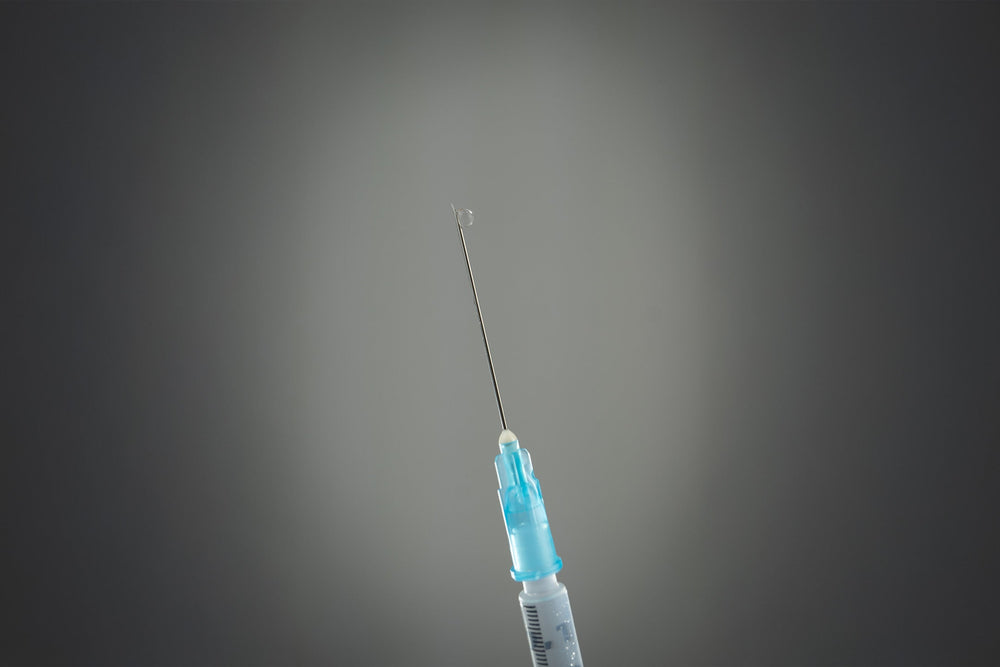NMN Injections vs Oral Capsules: Clinical Evidence & Risks Compared
21.08.2025
As NAD⁺ optimisation becomes a growing focus within the field of longevity and cellular health, NMN (Nicotinamide Mononucleotide) has emerged as a lead candidate. But with multiple administration options available, a key question arises: should you take NMN orally or via injection? This article provides a clinical, evidence-based comparison between NMN injections and oral NMN supplements.

While IV NAD⁺ infusions promise quick elevation of NAD⁺ levels, current evidence indicates that oral precursors like NMN or NR offer safer, more effective, and better-substantiated outcomes through sustained NAD⁺ enhancement and metabolic benefit.
What is NMN and Why Supplement It?
NMN is a direct precursor to NAD⁺ – a coenzyme essential for:
- Cellular energy metabolism
- DNA repair
- Mitochondrial function
- Immune regulation
- Healthy ageing
From our 30s onward, NAD⁺ levels decline significantly. NMN supplementation has been shown to restore NAD⁺ levels and support metabolic and cognitive function, making it one of the most researched molecules in longevity science.
Oral NMN vs Injections:
Understanding How They Work
What happens when you take Oral NMN (Capsules):
- NMN is absorbed via the gastrointestinal tract and converted to NAD⁺ in tissues like the liver and muscles.
- Advanced forms, such as micronised NMN, improve uptake efficiency.
- Stabilised NMN resists degradation by heat or oxidation, increasing shelf-life and efficacy.
What happens when you use Injectable NMN:
- Delivered via intravenous (IV) or intramuscular (IM) routes.
- Bypasses digestion and enters systemic circulation directly.
NMN injections can cause a rapid spike in NAD⁺ levels; however, clinical research suggests this elevation is short-lived. Despite growing commercial interest in intravenous NAD⁺ for brain health, no published randomized controlled trial to date has demonstrated measurable cognitive enhancement after a single infusion. Until such evidence emerges, the immediate cognitive effects of NAD⁺ IV therapy remain speculative.
NAD via Injection Therapy: Clinical Results
The study by Grant et al. examined the absorption of NAD⁺ delivered intravenously.
Eleven healthy male participants received a 750 mg IV infusion of NAD⁺, after which researchers measured plasma and urine levels of NAD⁺ and its metabolites to determine how much was reaching body tissues versus being excreted.
The researchers found that:
“Unexpectedly, plasma NAD⁺ levels did not rise until after two hours of continuous infusion”;
by the end of the infusion, substantial amounts of NAD⁺ and its metabolite meNAM appeared in the urine. This indicates that much of the administered NAD⁺ was rapidly metabolised or eliminated, with limited immediate retention in the body. Collectively, these findings highlight questions about the efficiency and value of IV NAD⁺, as the study provides no evidence for clinical or functional benefits and suggests potentially inefficient systemic elevation.
Study: Grant et al., Front Aging Neurosci, 2019).
Oral Ingestion of NMN: Clinical Results
In contrast, investigations into oral NMN administration consistently demonstrate that it is safe, well-tolerated, and leads to reliable increases in blood NAD⁺ levels without significant urinary excretion.
- In a 12-week, randomised, double-blind, placebo-controlled trial, healthy adults who took 250 mg/day of oral NMN experienced significant elevations in whole-blood NAD⁺ from week 4 onward, with no safety issues or excess urinary loss detected, evidence of effective systemic absorption and tissue utilisation
Study: Igarashi et al., Front Nutr, 2022).
- Additionally, a separate 12-week trial in older men (65+) using the same dose led to substantial increases in whole-blood NAD⁺ and related metabolites, again without adverse effects,supporting consistent absorption and metabolic incorporation in older individuals
Study; Igarashi et al., NPJ Aging Mech Dis, 2022).
- For further reading, see this article published by Translational Medicine (BMC) which reviews six key human clinical trials investigating oral NMN in healthy adults and older populations. It compiles data from these dose-dependent and placebo-controlled studies, ranging from 250 mg to 900 mg daily NMN.
This growing body of evidence indicates that oral NMN not only supports long-term wellness goals but is also better aligned with human clinical research than injectable forms.

Injection Risks: What You Should Know
Injecting NMN carries a range of clinical risks:
-
INFECTION OR CONTAMINATION
If not performed under sterile conditions, IV/IM injections may introduce pathogens to your system.
-
DOSING UNCERTAINTY
Human dosing remains experimental, and overuse could disrupt methylation cycles.
-
CLINICAL SUPERVISION REQUIRED
Not suitable for self-administration.
There’s also the issue of temperature control. Most NMN injectable preparations require refrigeration or cold-chain transport to remain stable. This adds logistical complexity and cost.
What to Know Before Considering Injections
If you are exploring NMN injections, consult a qualified practitioner trained in metabolic or anti-ageing medicine. You should also consider:
-
TYPE OF INJECTION
IV (direct to bloodstream) vs IM (slower release).
-
DOSING
Ranges from 100 mg to 500 mg per session.
-
FREQUENCY
Weekly or biweekly injections are typical.
-
COST
Between £150–£400 per session, depending on clinic and location.
-
STORAGE
Most injectable NMN products require refrigeration.
-
ACCESS
Available only through specialised longevity clinics or compounding pharmacies.
Clinical Evidence: Oral NMN Dominates in Study Volume
The data overwhelmingly supports oral supplementation:
- 30+ peer-reviewed studies on oral NMN (human and animal).
- Includes trials from Keio University, Washington University, and others.
- Validated for NAD⁺ increase, insulin sensitivity, vascular flexibility, and cognition.
In contrast:
- Fewer than 5 public studies examine injectable NMN.
- Most are animal-based or small pilot studies.
- Lacks long-term safety, dose guidance, or regulatory clarity.
This disparity underscores the lower risk, higher predictability, and broader clinical confidence in oral NMN delivery.
Comprehensive Comparison:
NMN Capsules vs Injections


Why Choose Manapura Pure NMN 1000mg Capsules?
Manapura Pure NMN offers what few other UK-based NMN supplements can:
- Enzymatic, bioidentical β-NMN synthesis.
- 99.97% pharmaceutical-grade purity, verified by third-party labs.
- Zero fillers, no magnesium stearate, no flow agents.
- 1000mg dose per serving—clinically relevant and clearly labelled.
- Micronised particles for superior absorption.
- Vegan, gluten-free, and allergen-free.
- Stabilised form that remains potent during shipping and travel.
It’s the scientifically aligned, clinically relevant, and consumer-conscious choice for anyone serious about NAD⁺ optimisation.
Final Thoughts
While NMN injections offer a fast track to NAD⁺ elevation, they come with greater risks, higher costs, and far less research backing. Oral NMN supplementation, especially when formulated with clinical integrity, as with Manapura Pure NMN 1000mg, offers a safe, effective, and evidence-backed solution for long-term NAD⁺ support.
If you're considering NMN supplements in the UK, choose a product that matches the standard of modern clinical research. Choose Manapura.




